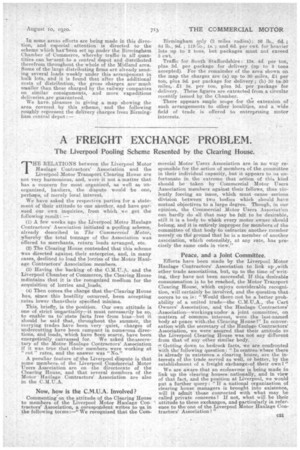A FREIGHT EXCHANGE PROBLEM.
Page 19

If you've noticed an error in this article please click here to report it so we can fix it.
The Liverpool Pooling Scheme Resented by the Clearing House.
HE RELATIONS between the Liverpool Motor Haulage Contractors' Association and the
Liverpool Motor Transport Clearing House are not very harmonious, and, were it not a matter that has a concern for most organized, as well as unorganized, hauliers, the dispute would -be one, perhaps, of merely local interest.
We have asked the respective parties for a, statement of their attitude to one another, and have pursued our own inquiries, from which we get the following result: —
(1) A .few weeks ago the Liverpool Motor Haulage Contractors' Association initiated a pooling scheme, already described in The Commereial Moto., Ivhereby the total tonnage of the. Association was offered to merchants, return loads arranged, etc.
(2) The Clearing House contended that this scheme was directed against their enterprise, and, in many eases, declined to load the lorries of the Mater-Haulage Contractors' Association members.
(3) Having the hacking of the C.M.U:A. and the Liverpool Chamber of Commerce, the Clearing House ingintains that it is the recognized medium for the acquisition of lorries andeloads.
• (4) Then comes the charge that the,CIearing House has, since this hostility occurred, been accepting rates lower than.their specified minima.
This, briefly, is the position. Our own attitude is one of strict impartiality—it must necessarily be BO, to enable us to state facts free from bias—but it should be said that, throughout the summer, the carrying trades have been .very quiet, charges of undercutting have been rampant in numerous directions, and loads, which have been scarce, have been energetically canvassed for. We asked theoseeretary of the Motor HaulageContractors' Association if it was true that their members were working at " cut" rates, and the answer was "No."
A peculiar feature of:the Liverpool dispute is that some members of the Liverpool C.,oranercial Motor Users Association are on the directorate of the Clearing House, and that several members of the Motor 'Haulage Contractors' Association are also in the C.M.U.A.
Now, how is the C.M.U.A. Involved ?
Commenting on the attitude of the Clearing House to members of the Liverpool Motor Haulage Contractors' Association, a corespondent writes to, us. in the following terms:—" We recognized that the Com mercial Motor Users Association are in no. way responsible for the action of members of the committee in their individual capacity, but it appears to us unfortunate in the extreme that action of this kind should be taken by Commercial Motor Users Association members against their fellows, thus violently forcing an issue, which must cause • serious division between two bodies which should have mutual objectives to a large degree. Though, in our opinion, the Commercial Motor Users Assoeiation can hardly do all that may be felt to be desirable, still it is a body to which every motor owner should belong; and it is entirely improper for members of the committee of that body to ostracize another member merely on the ground that he is a member of another association, which ostensibly, at any rate, has precisely the same ends in view."
Peace, and a Joint Committee.
Efforts have been niad.e by the Liverpool Motor Haulage Contractors' Association to. link up/with other trade associations, but, up to the time of writing, they have not been successful. If this desirable consummation is to be reached, the Motor Transport Clearing House, which enjoys considerable recognition, will certainly be involved, and the question thatoccurs to us is : "Would there not be a better probability of a united trade—the C.M.U.A., the Cart Owners' Association, and the Haulage Contractors' Association—workingT under a joint committee, on ,matters of common interest, were the last-named body at-peace with,the Clearing House?" In convereation with the secretary of the Haulage Contractors' Association, we were assured that their attitude to the Liverpool Clearing House was not any different from that of any other similar body.
Getting down to bedrock facts, we are confronted with .the followingquestion: " In centres-where there is already in existence a clearing house, are the in-' terests of the trade served as well, or better, by the establishment of a freight eichange,of their own?"
We are aware,that an endeavour is being made to link up the clearing houses. nationally, and in view of that fact, and the position at Liverpool, we would put a further query: If a national organization of clearing house managers is brought into existence, will it admit those connected with what may be called private concerns? If not, what will be their attitude to these exchanges, and particularly in reference to the one of the Liverpool Motor Haulage Contractors' Association? "






























